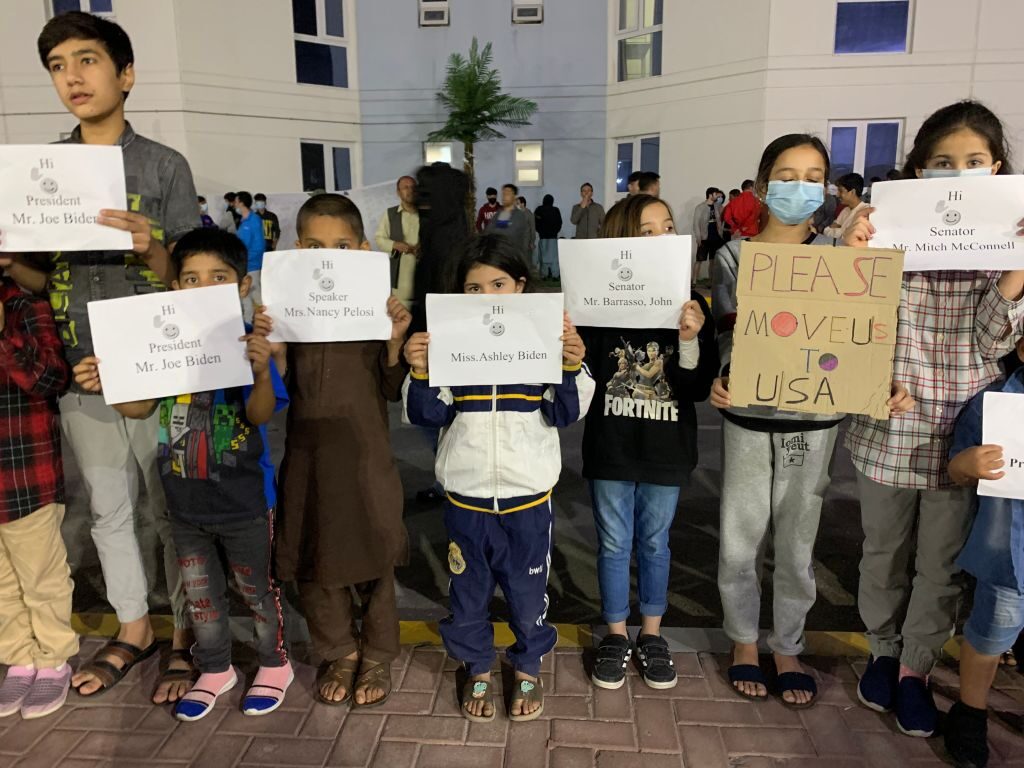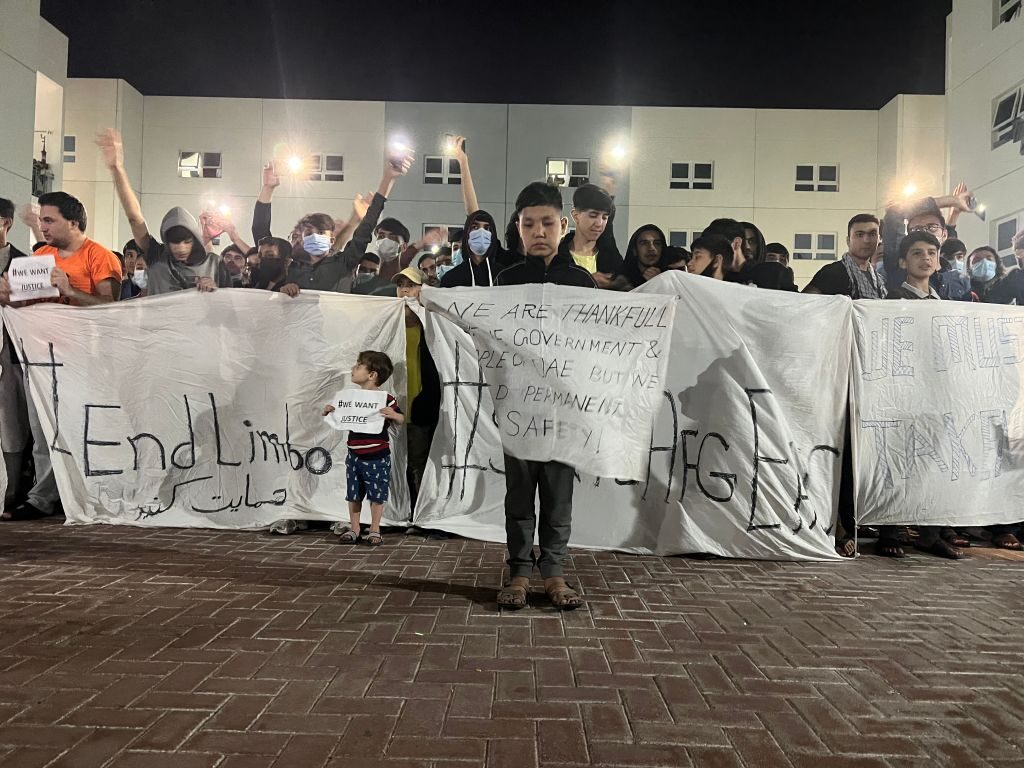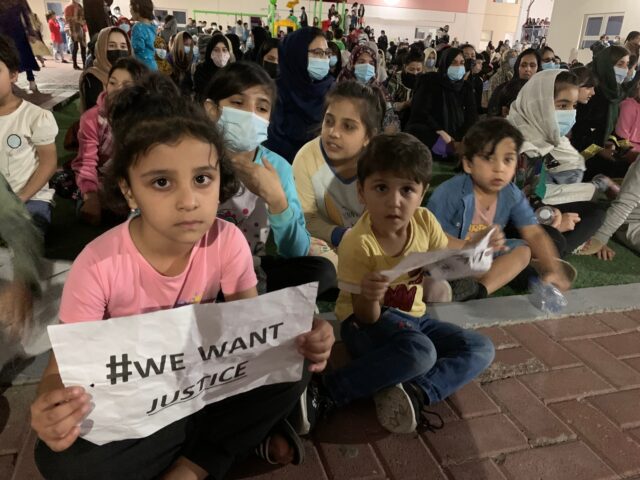Afghan refugees who fled their country a year ago after the Taliban seized Kabul organized two days of protests on Monday and Tuesday in United Arab Emirates (UAE), where they have been trapped in a migrant facility with little information regarding any potential departure.
Images from the “Emirates Humanitarian City” in Abu Dhabi, which at its peak last year held about 12,000 Afghan refugees, showed large numbers of children marching with their families and holding up signs reading “we want justice.”
The refugees stated that the Emirati government – and the American government, which in many cases aided their evacuation – had yet to give them any information regarding their departure to a new home country and did not let them leave the migrant facility, making it impossible for them to resume their lives.
The incident resembled a similar protest in Antananarivo, Madagascar, where another group of Afghans complained that they had found no way to permanently settle anywhere else. The protest in Madagascar has not, at press time, resulted in any significant changes in conditions for the Afghans in that country.
Madagascar and UAE were among several countries that accepted requests from the United States to temporarily take in Afghan refugees in the immediate collapse of the U.S.-backed government in Kabul last year. The administration of President Joe Biden made the requests to grant its federal officials time to process the individuals and ensure that they did not have any ties to the international terrorist organizations before resettling them in America.

Afghans rallied in an Afghan refugee camp in Abu Dhabi, the capital of the United Arab Emirates, to protest the non-transfer to the United States on Sunday, February 13, 2022. (Sayed Najafizada/NurPhoto via Getty Images)
As of July 2022, the Biden administration has accepted 86,000 Afghans, resettled in America, in 46 states. The process of vetting the refugees has been so cumbersome that the Biden administration announced in June that it would accept Afghans with a record of offering “limited material support to a designated terrorist organization.” The Department of Homeland Security (DHS) and the State Department announced a further easing of requirements for Afghan migrants a month later.
A senior State Department official had promised to finish resettling Afghans who fled the Taliban in August 2022.
The Taliban, a Sunni jihadist terrorist organization, seized Kabul on August 15, 2021, following the abandonment of the country by then-President Ashraf Ghani, who also fled to the UAE. Ghani claimed to still be the president of Afghanistan in an interview shortly before the one-year anniversary of his abandoning his people.
A year after fleeing the Taliban terrorists, Afghans in Abu Dhabi said they had no information regarding any potential permanent settlement.
“Nearly one year, we have been here in detention and the camp is like a modern prison. No one is allowed to go out, they don’t know when (we) will be settled permanently to any country,” an Afghan refugee at the UAE facility told Reuters anonymous on Tuesday. The refugee and one other that Reuters did not name, who presumably participated in the protest, described a “deteriorating” mental health situation in the facility.
Reuters described “hundreds,” including many children, marching within the migrant housing center and holding up banners.
“Men and children chanting ‘we want justice’ were seen in one video wearing white blindfolds inscribed with the word ‘freedom,’ Reuters reported. “The men and some children had bound their wrists, in an apparent gesture to what some Afghans said are prison-like conditions in the facility.”
The regional news outlet Middle East Eye reproduced images and videos from the facility that resembled the descriptions in Reuters.
Midnight Update from EHC:
Again the Afghans in EHC tied up their hands and asking for freedom and justice.#Endoneyearlimbo_EHC @RoyBlunt @shawnjvandiver @ChrisCoons @Afghan_Evac @afghanevac @Larkabroad @FaramarzTamanna pic.twitter.com/D8cpxcODEz— Rashid Waris (@RashidWaris15) August 23, 2022
Some Afghan refugees have described the Emirates Humanitarian City facility in Abu Dhabi as "a modern prison" https://t.co/qiDalva6HG
— The New Arab (@The_NewArab) August 24, 2022
Remember all the Afghans our troops sacrificed their lives helping evacuate from Kabul a year ago?
Many are still in limbo in relocation camps, a year later waiting to be let into the US.
Some have begun protesting the delay.
Video: a camp in Abu Dhabi.pic.twitter.com/pTtr5nYrFw— Alexander McCoy (@AlexanderMcCoy4) August 22, 2022
Afghan refugees in UAE protest against uncertainty and 'prison-like' conditionshttps://t.co/ucE9pc3LUF pic.twitter.com/XqzzxVDtaj
— Middle East Eye (@MiddleEastEye) August 24, 2022
Some Afghans held signs demanding to be released into America, though most used less specific messages such as “we want justice.”
The Reuters news agency reported that it had managed to contact an official within the Emirati government who “acknowledged there were frustrations” but offered little more information. The U.S. State Department told Reuters it had gotten 10,000 Afghans out of the UAE facility so far and continued its “relentless” work to process them.
A much smaller population of Afghan migrants in Madagascar similarly organized a protest in July outside of the American embassy in the nation’s capital; Madagascar does not have a dedicated facility for the migrants as the UAE does, as those in the country had not abruptly fled the return of the Taliban.
“At least a dozen Afghans including both adults and children gathered on Monday outside the embassy premises, saying they had applied for the US Refugee Admissions Program in 2019,” the Qatari news agency al-Jazeera reported last month, “but were yet to receive any updates until two months ago, when they had interviews with a US Citizenship and Immigration Services (USCIS) agent.”
“Those gathered said they had worked in support of either NATO [North Atlantic Treaty Organization] forces or US and foreign companies and non-profits in Afghanistan, and as a result, faced Taliban retribution if they returned to their home country,” according to the outlet.

Afghan refugees, who have been living in the Gulf for the past six months, have been protesting in refugee camps, demanding immediate repatriation as promised by the United States and European countries. (Sayed Najafizada/NurPhoto via Getty Images)
Thousands of Afghans, particularly those who had cooperated with America during the 20-year Afghan War, fled the country last year as the Taliban returned to power. The United States had launched a war within the country to oust the Taliban from power, which it retained since 1996, in 2001 in response to the September 11 terrorist attacks. The Taliban has maintained an alliance for decades with al-Qaeda, the Sunni terrorist organization responsible for the attacks.
Former President Donald Trump brokered a deal during his time in office with the Taliban that would have ended the Afghan War on May 1, 2021, retaining power for the Afghan government while ending most hostilities and, pivotally, the U.S. presence in the country. Current President Joe Biden violated the agreement, expanding the war into August. The Taliban responded by launching tens of thousands of attacks on the Afghan government that culminated in the group’s arrival in Kabul on August 15. Ghani fled, resulting in a bloodless takeover of the national government by Taliban terrorists.
Follow Frances Martel on Facebook and Twitter.

COMMENTS
Please let us know if you're having issues with commenting.